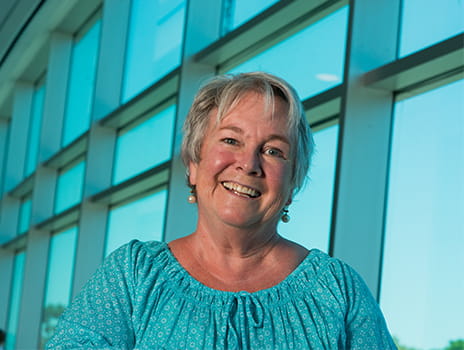A Stroke of Luck Motivates a Survivor


November 01, 2018
Comprehensive care helps a stroke survivor enjoy her life plans
"I call it my stroke of luck," Deb Wagman says with a gentle smile. After suffering a major stroke in October 2014, Wagman has a new view of life.
With no family history of stroke, Wagman was angry and embarrassed when her family suddenly swarmed around her while leaving a movie in Lawrence, Kansas. She felt fine as they laid her in the grass outside the theater, but her son-in-law recognized the signs. An EMT and ski patrol member, he knew her sudden slurred speech and facial droop were serious.
"My husband wanted to drive me to the hospital, but my son-in-law said absolutely not. He insisted we call an ambulance," Wagman recalls.
I'm The University of Kansas Health System's No.1 fan. Everyone from the doctors to the nursing staff is absolutely amazing. – Deb Wagman
Transported to Lawrence Memorial Hospital, Wagman was given tPA, a protein administered intravenously that helps break down blood clots. But her critical diagnosis required more extensive treatment. She was life-flighted to The University of Kansas Health System's Advanced Comprehensive Stroke Center.
Two blood clots were blocking vessels in Wagman's brain. The clots may have been caused by an undiagnosed heart condition called patent foramen ovale or PFO. All infants in utero have an opening in the heart wall between the 2 upper chambers. It normally closes a few weeks after birth. Wagman's never did.
Interventional radiologist Alan Reeves, MD, describes her type of stroke as a killer. Every minute matters with a stroke, so the health system's stroke team was at Wagman's side the moment her helicopter arrived. Dr. Reeves performed an endovascular procedure using mechanical thrombectomy to remove the blood clots threatening Wagman's life.
In this minimally invasive procedure, a stent retriever is positioned in the clot for a few minutes. When the device is later retracted from the vessel, it pulls out the clot and restores blood flow. Within an hour, full blood flow was restored to Wagman's brain. Less than 2 days later, she was sent home with her family to begin physical, speech and occupational therapy.
Since her stroke, Wagman has continued follow-up care at The University of Kansas Health System. In January, Dr. Reeves inserted a Pipeline™ Embolization Device (PED) to treat an aneurysm that was luckily found during follow-up scans. In this procedure, a wire mesh PED cylinder was inserted to redirect blood flow away from the aneurysm, causing it to clot. Wagman returns every 4 months to impress neurointensivist Kathrin Husmann, MD, with her progress. She continues to see her cardiologists to treat her heart condition.
"I'm so glad to see all of my doctors in one place. If something happens to me somewhere else, put me on a plane. I want to go to The University of Kansas Health System," Wagman declares.
A model patient, Wagman credits fear of having another stroke as motivation for making healthy changes in her life. "I felt so damaged after the stroke, but everyone at The University of Kansas Health System was so soothing and reassuring," Wagman recalls. "They told me I could get everything back. And they were right. In many ways I'm actually better than before, because I'm taking better care of myself."
A formerly inactive person, Wagman began training for a big goal in her life: a 50-mile hike in Iceland or Newfoundland. She walks 2 miles every day and has completed two 5Ks since her stroke. "I want to do this fabulous thing before I die," Wagman muses.
She is even taking a step back from her stressful, deadline-driven job as a freelance writer for local and national publications.
"High-stress living can knock the joy out of your life. There are other things more important to me: my garden, my grandson, training for my big hike. That's all more important," Wagman says.
"It's exciting to get another chance. I like my life. I want to keep living. The University of Kansas Health System is going to get me there. I'm their No. 1 fan."
We offer a variety of appointment types. Learn more or call 913-588-1227 to schedule now.